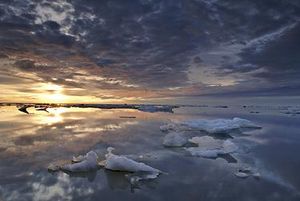Difference between revisions of "Arctic Ocean"
| Line 1: | Line 1: | ||
| − | [[File: | + | [[File:Arctic ocean photo.jpg|thumb|left]] |
| − | |||
| − | |||
| − | |||
| − | |||
| − | |||
| − | |||
| − | |||
{| class="infobox width=350px style="float:right;border:1px solid black; margin-left: 10px " | {| class="infobox width=350px style="float:right;border:1px solid black; margin-left: 10px " | ||
| Line 28: | Line 21: | ||
|} | |} | ||
| + | |||
| + | America's Arctic Ocean, the Beaufort and Chukchi seas, is home to polar bears, bowhead whales, walrus and many other iconic animals. Yet oil and gas development continues to threaten these waters despite a serious lack of scientific understanding of the region and no credible means for cleaning up an oil spill in the Arctic's harsh and remote conditions. America’s Arctic is ground zero for the devastating impacts of climate change – warming at twice the rate of the rest of the world – and offshore drilling will only exacerbate the problem. | ||
[[#Fact Sheets|Fact Sheets]] | [[#Congressional Letters|Congressional Letters]] | [[#Public Letters|Public Letters]] | [[#Maps|Maps]] | [[#Reports & Previous Attempts to Drill|Reports & Previous Attempts to Drill]] | [[#Fact Sheets|Fact Sheets]] | [[#Congressional Letters|Congressional Letters]] | [[#Public Letters|Public Letters]] | [[#Maps|Maps]] | [[#Reports & Previous Attempts to Drill|Reports & Previous Attempts to Drill]] | ||
| + | |||
'''''Opportunities to Show Support''''' | '''''Opportunities to Show Support''''' | ||
| Line 47: | Line 43: | ||
*''Coastal communities.'' The Arctic Ocean is central to life in coastal communities, and plays an important role in regulating the world’s climate. | *''Coastal communities.'' The Arctic Ocean is central to life in coastal communities, and plays an important role in regulating the world’s climate. | ||
*''Climate Change.'' The Arctic is ground zero for the devastating impacts of climate change – warming at twice the rate of the rest of the world. Sea ice is declining, permafrost is melting and coastlines are eroding, and in order to avoid exacerbating these problems, Arctic Ocean oil must remain right where it is. | *''Climate Change.'' The Arctic is ground zero for the devastating impacts of climate change – warming at twice the rate of the rest of the world. Sea ice is declining, permafrost is melting and coastlines are eroding, and in order to avoid exacerbating these problems, Arctic Ocean oil must remain right where it is. | ||
| − | |||
==<span id="Fact Sheets"></span>Fact Sheets== | ==<span id="Fact Sheets"></span>Fact Sheets== | ||
Revision as of 14:42, 13 September 2018
| KEY FACTS |
|
America's Arctic Ocean, the Beaufort and Chukchi seas, is home to polar bears, bowhead whales, walrus and many other iconic animals. Yet oil and gas development continues to threaten these waters despite a serious lack of scientific understanding of the region and no credible means for cleaning up an oil spill in the Arctic's harsh and remote conditions. America’s Arctic is ground zero for the devastating impacts of climate change – warming at twice the rate of the rest of the world – and offshore drilling will only exacerbate the problem.
Fact Sheets | Congressional Letters | Public Letters | Maps | Reports & Previous Attempts to Drill
Opportunities to Show Support
- S.2720, Clean Coasts Act
- Introduced by Sen. Cantwell (D-WA), this bill would codify the Outer Continental Shelf (OCS) Blowout Preventer Systems, the Well Control Rule, and the Arctic Drilling Rule.
- H.R. 1784/S. 991, Stop Arctic Ocean Drilling Act
- Introduced by Rep. Huffman (D-CA-2)/Sen. Merkley (D-OR), this bill would prohibit oil and gas leasing in the Arctic Planning Area of the Outer Continental Shelf.
- H.R. 2248/S.985, Keep the Five Year Plan Act
- Introduced by Rep. Pallone (D-NJ-6)/Sen. Markey (D-MA), would prohibit the Secretary of the Interior from revising the approved oil and gas leasing program for fiscal years 2017 through 2022.
Talking Points
- Widespread support. Arctic communities, scientists, and a majority of Americans recognize that Arctic drilling is too risky and too dirty to allow. With 125 million acres protected in total by administrative actions in 2015 and 2016, our nation is closer to the clean energy future that will safeguard our climate.
- Drilling is risky and irresponsible. The risk of an oil spill is proven and it is significant – if oil spills, it will be a disaster. As we’ve seen from the Deepwater Horizon and Exxon Valdez spills, there is no such thing as an effective clean up: once oil has been spilled, the battle has been lost. In the Arctic, the Department of the Interior’s own assessment found that there was a 75% chance of an oil spill of greater than 1,000 barrels with just the Chukchi Sea leases sold under the Bush administration.
- Diverse wildlife. Our Arctic Ocean, the Beaufort and Chukchi seas, provides habitat for countless species of wildlife, such as whales, polar bears, walrus, seals and hundreds of species of birds.
- Coastal communities. The Arctic Ocean is central to life in coastal communities, and plays an important role in regulating the world’s climate.
- Climate Change. The Arctic is ground zero for the devastating impacts of climate change – warming at twice the rate of the rest of the world. Sea ice is declining, permafrost is melting and coastlines are eroding, and in order to avoid exacerbating these problems, Arctic Ocean oil must remain right where it is.
